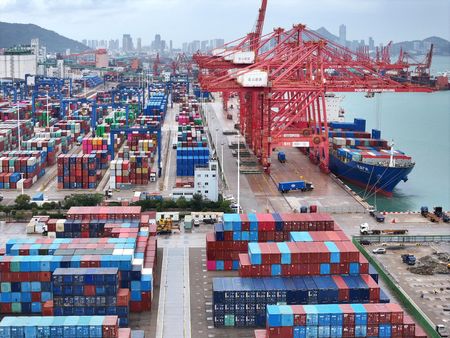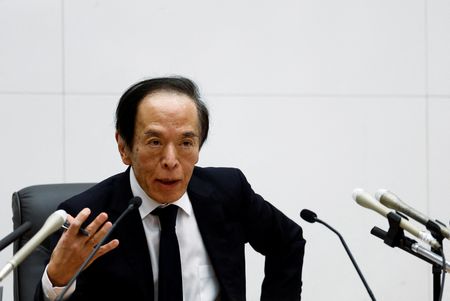By Katya Golubkova and Trixie Yap
(Reuters) -Oil prices retreated on Tuesday as U.S. President Donald Trump paused for a month a decision on steep tariffs on Mexico and Canada, the United States’ biggest foreign oil suppliers, while prospects of higher OPEC+ supplies from April also weighed.
Brent futures fell 50 cents, or 0.7%, to $75.46 a barrel by 0432 GMT, while U.S. West Texas Intermediate (WTI) crude declined 89 cents, or 1.2%, to trade at $72.27.
Both Canadian Prime Minister Justin Trudeau and Mexican President Claudia Sheinbaum said they had agreed to bolster border enforcement efforts in response to Trump’s demand to crack down on immigration and drug smuggling.
That would pause for 30 days tariffs of 25%, with a 10% tariff on energy imports from Canada, that had been set to take effect on Tuesday.
“The dominant theme for global markets has been all about US tariffs,” IG market strategist Yeap Jun Rong said in an email.
While the tariff delay for Mexico and Canada has given room for risk sentiment to improve and contributed to an unwinding in the U.S. dollar, oil prices have struggled to regain the upside, Yeap added.
“The prospect of higher oil supplies (OPEC+) returning to markets from April could be a key overhang for prices … especially with oil prices still at Oct. 2024 levels.”
The Organization of the Petroleum Exporting Countries and its allies, a group known as OPEC+, discussed on Monday a call by Trump to raise production, but agreed to stick to its policy of gradually raising oil output from April.
However, ING analysts warned that Canada would stay vulnerable to trade wars unless it expanded its export options beyond the United States, with more pipelines from oil fields to ports.
“It would take several years to build this infrastructure, but it would provide Canadian producers more flexibility and the potential for more destinations for Canadian oil,” ING said.
Trump plans to speak with Chinese President Xi Jinping as soon as this week, the White House said, as a 10% duty on all China goods is set to take effect later on Tuesday.
On the demand side, investors will be looking out for weekly U.S. oil stockpile data for the week to Jan. 31. [EIA/S] Analysts polled by Reuters expected that crude inventories rose, while gasoline and distillate inventories probably fell.
US crude inventories are expected to be up 10.8 million barrels for the week ending January 31, while gasoline inventory builds are likely at 500,000 barrels, said Macquarie energy strategist Walt Chancellor.
(Reporting by Katya Golubkova in Tokyo; Editing by Sonali Paul and Clarence Fernandez)










